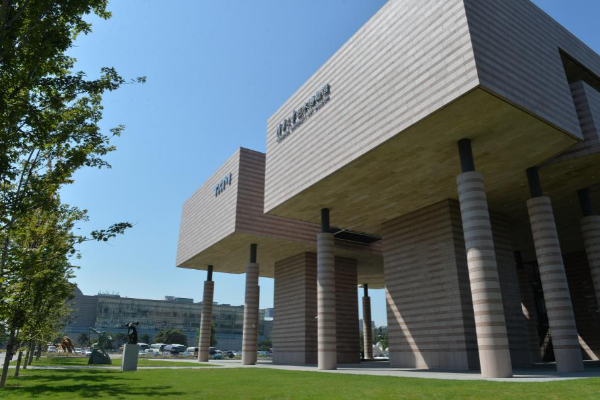Tsinghua University Art Museum

Tsinghua University Art Museum
清华大学艺术博物馆
Address: 1 Qinghuayuan, Haidian district (inside Tsinghua University), Beijing
Websites:
www.artmuseum.tsinghua.edu.cn (Cn)
www.artmuseum.tsinghua.edu.cn/en/ (En)
Hours: 9:00-17:00 (no entry after 16:30)
Closed Mondays (except for national holidays), Chinese New Year's Eve, and from the 1st to the 10th day of the Chinese lunar year
General admission: 20 yuan ($2.84)
Tel: (+86-10)62781012
Email: tam@tsinghua.edu.cn

Tsinghua University Art Museum holds more than 13,000 pieces/sets of art, including calligraphy, paintings, textile, ceramics, furniture, and bronze ware, most of which are from the university's Academy of Arts and Design or have been donated by alumni and other public figures.
The 1,400-plus calligraphy and paintings span the period from the Yuan Dynasty (1271-1368) to modern and contemporary times, including masterpieces by Wen Zhengming (1470-1559), Lyu Ji (1429-1505), Zheng Xie (1693-1766), Qi Baishi (1864-1957), and Xu Beihong (1895-1953).
The 4,600 pieces/sets in the textile collection cover the periods of the Ming and Qing dynasties (1368-1911), up to modern and contemporary times. The earliest of the 2,700-plus pieces/sets of ceramic objects can be dated back to Neolithic times (ca.8000-2000BC), and they include terracotta, gray pottery, black pottery, proto-porcelain, celadon, objects with glazes of different colors, and painted porcelain pieces.
The 1,400-plus pieces/sets of furniture date from the Ming Dynasty(1368-1644) to contemporary times and are mostly tables, chairs, stools, and shelves, as well as some beds and chests.
The museum building - a four-storey space -was designed by the globally-acclaimed Swiss architect Mario Botta. Construction of the museum was completed in April 2016, shortly after which the museum was opened to the public.
Aside from exhibitions, collections, and academic research, the museum also organizes a series of public activities in the form of lectures, interactive and participatory events, and hands-on practices that focus on academic, ideological, and artistic values, bringing the general public closer to the art.
In addition, the museum joins with other forces in carrying on the historical development of human civilization through providing access to the masterpieces of its collection, acquiring the latest original creations, promoting institutional exchange both in China and abroad, and offering open access to museum resources.




